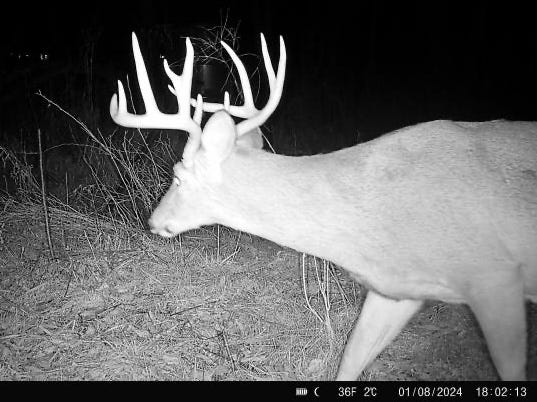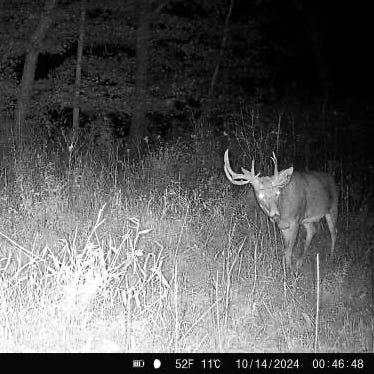At some point, the weight becomes too much.
For North American cervids like whitetails, mule deer, elk, caribou, and moose, antler shedding is inevitable.
It’s a slow process that starts beneath the surface, long before the antlers hit the ground. By late winter, after months of scarce food and cold air pulling every last bit of energy from their bodies, their antlers begin to loosen. One day, they’ll shake their head and a side will drop. Sometimes both fall within hours. Other times, they walk lopsided for a week, waiting for the second one to let go.
I have yet to personally ask a deer myself, but I have a feeling that there’s no mourning on the day of the drop. No hesitation. No sentimentality for the rack they wore through the rut, the one they used to fight, to posture, to hold their place in the herd.
I doubt the bulls trudge through the snow looking for their missing tines. The bucks don’t spend the off-season reminiscing about last year’s spread.
They move forward because that’s what nature tells them to do.
The Time to Shed
The process takes time. Antlers don’t just drop because the animal is tired of carrying them. They fall when the body decides it’s time. When the energy spent holding onto them becomes a liability instead of an asset.
As with many of the laws of nature, we should be taking closer notes.
There are things we hold onto because we think we need them. A reputation we built when we were younger. An expectation we once had for ourselves, but no longer fits the life we live.
Some things stay with us longer than they should because we’re not ready to drop them. But there comes a time when holding on does more harm than good. When the weight costs more than the value.
And when that moment comes, we don’t get a guarantee of what’s next.
What Comes Next
Many believe that everything they let go of will be replaced by something better. That every loss is a step toward something greater, that growth is always a straight line pointing up.
That may be true in some cases, but nature doesn’t always work that way.
A young bull in his prime might grow back a bigger, stronger rack next year. An old buck, past his peak, might come back smaller. An injured deer might sprout only one side, his body too damaged to support a full set. A moose that suffered through a brutal winter might grow back something uneven, gnarled, stunted.
Antlers don’t always return better than before. They return based on what’s already happened, the lived experience combined with the resources available.
Some years, we come back stronger. Other years, we’re lucky to just come back.

The Fear of Letting Go
Shedding antlers isn’t always about the burden of extra weight. Like other natural world cadences, it marks the end of one season and the beginning of the next.
It reflects the finality of one period in time.
One of the many differences between humans and cervids is our focus on finality. The thought that if we drop something, we’ll never get it back. That shedding means losing, and losing means failure.
Failure isn’t in the shedding. It’s in refusing to shed at all.
In the wild, the cost of keeping what no longer provides value is far greater than the cost of letting it go. A bull that holds his antlers too long risks injury. A whitetail that won’t drop his rack burns energy he can’t afford to waste.
We don’t all have that instinct. We cling to what’s familiar, even when it drags us down. We fear the empty space that follows, as if what we shed will never be replaced by something new.
If you watch deer over the course of a year, you know that shedding isn’t the end, it’s just a reset.
A chance to rebuild with what you have now, not what you were holding onto before. Maybe what comes next will be stronger. Maybe it won’t. But clinging to what’s outlived its purpose only guarantees that you’ll never make room for anything else.
Don’t Look Back
We’re not as good at shedding as the animals are.
We dwell on what we lost. We wonder if we should’ve held on a little longer. We second-guess whether we made the right call.
There’s no promise that what comes next will be bigger or better. No assurance that cutting ties, moving on, or changing paths will lead to something immediately worthwhile.
But the alternative? Holding onto something past its prime? Carrying weight that’s meant to be dropped?
That doesn’t make you stronger. It just makes you slower.
The buck doesn’t ask what comes next. He doesn’t need a guarantee. He just knows when it’s time.
And when that moment comes, he walks forward and doesn’t look back.
From My Desk:
What I’m Thinking About: I haven’t found a shed in a few years… I’m hoping to change that this year.
What I’m Doing: Unpacking from my ski/ business trip in Colorado. It was fun to be out west, but this Midwest Cowboy is happy to be home for awhile.
On Deck for Monday: Projects I thought would start in January are just starting to wake up from their New Year slumber. New work is on the horizon and I’m anxiously awaiting the billable hours.
From The Field Review Archives:
The Field Review is a space for exploring the intersection of work, life, and the great outdoors. It’s about figuring ‘it’ out—whatever your ‘it’ might be.
Every Sunday at 10AM EST, I share ideas, insights, and conversations that help break through the noise, offering a real look at how we can all keep moving forward.
If you have any thoughts, questions, or topics you'd like me to explore in future newsletters, feel free to reach out!
Venture Onward,
Jack









This is fascinating to think about, Jack. You mentioned fear of failure as reasons why we may hold onto something for too long. I think emotional attachment is another.
Meanwhile the deer just shed and move on. It makes you wonder what the right balance is. I’m sure you’ve thought about it and appreciate this post.